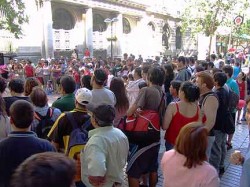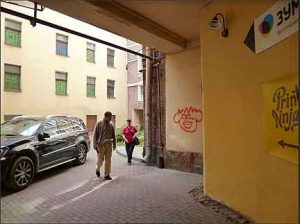
When you research your destination, check on crime and security issues, too. Knowing what commonly happens and where gives you the edge. The goal is to be mentally prepared and to understand the local risks. You can then adapt your awareness level to the specific situation. If, for example, you know that sneak thieves prey on tourists watching street entertainment, you can enjoy the entertainment with a hand on your valuables or your backpack on your chest.
Most travel guidebooks include a section on crime and safety. The internet has a wealth of information, limited only by your search skills. Advice found on the internet is unregulated so the reliability of the source must be considered. The United States Department of State Bureau of Consular Affairs (travel.state.gov) posts annual reports on the conditions in every country a traveler might visit, and many we wouldn’t dream of visiting. These so-called Consular Information Sheets are politically flavorless; the U.S. government does not massage information in order to pander to advertisers or foreign ministries of tourism. The U.S. State Department is unbiased and tells it like it is, ruffled feathers be damned. Special updates are posted between annual reports whenever conditions change.
Consular Information Sheets are not exhaustive on the subject of crime, but they do cover numerous subjects of interest to a visitor. In addition to current crime trends, a typical report describes: the country and its major cities; its entry and exit requirements (including visas, departure taxes); safety and security issues (political and ethnic tensions, existence of anti-foreign sentiment, land mine dangers); medical facilities and health issues (vaccines, diseases, water quality); traffic safety and road conditions; aviation safety; railway safety; customs regulations (bringing electronic equipment in, antiquities out); currency regulations; child issues; criminal penalties; embassy locations; and more.
Reading the U.S. government’s report on France could have saved Cecily her anguish. “Thefts from cars stopped at red lights are common, particularly in the Nice-Antibes-Cannes area, and in Marseille. Car doors should be kept locked at all times while traveling to prevent incidents of ‘snatch and grab’ thefts. … Special caution is advised when entering and exiting the car, because that offers opportunity for purse-snatchings.”
The government reports trends, not singular events. The few specific techniques that make it into the Consular Information Sheets should be taken seriously.
Continues here.
Excerpt from Travel Advisory: How to Avoid Thefts, Cons, and Street Scams
Chapter Two (part-b): Research Before You Go
![]()







2 Comments
[…] I started talking about Consular Information Sheets here. […]
This is great info, and great suggestions. No one we know has ever taken advantage of these excellent sources.